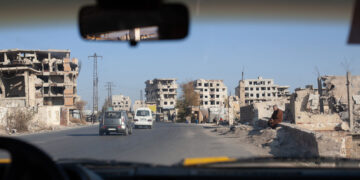Michael Omer-Man is the Director of Research for Israel-Palestine at DAWN.
Israel's incoming government, following elections in early November, could be the most extreme in its history. With far-right Jewish supremacists taking Cabinet positions in Benjamin Netanyahu's likely coalition, there are many very real dangers ahead, primarily to Palestinians in all areas under Israeli control, both in Israel proper and in the occupied West Bank and besieged Gaza Strip. Israeli institutions are also at risk, including a judiciary that could be politically hijacked. If history teaches us anything, the world will likely stand idly by as these dangers unfold. The same extremist government, however, also presents a unique opportunity for countries around the world, most of all the United States, to reevaluate their own policies on Israel-Palestine.
Netanyahu, the presumptive incoming prime minister, has opposed Palestinian national self-determination and advanced expansionist and annexationist policies in the occupied territories his entire political career as Israel's longest-serving prime minister. Due to political realities largely of his own design, however, more often than not, the governments he led constrained the most far-right policies. But this time around, the political reality is largely being dictated by others with even more extreme positions. Netanyahu put his political fortune—and quite possibly his freedom, owing to an ongoing corruption trial—in the hands of three illiberal Jewish supremacist parties that are willing to help put an end to the Likud leader's legal troubles in exchange for a taste of power.
Those parties, including the extremist, supremacist Jewish Power led by Itamar Ben-Gvir, will need something to show for however long they manage to stay in power. The United States, the European Union and the rest of the international community will soon find that the Israeli policies they have spent so much political capital and leverage trying to stop are suddenly back on the agenda—and with an Israeli "partner" not only unwilling to pay any lip service to a two-state ideal, but unabashedly working to destroy all paths to it.
The United States, the European Union and others will soon find that they are dealing with an Israeli "partner" not only unwilling to pay any lip service to a two-state ideal, but unabashedly working to destroy all paths to it.
- Michael Omer-Man
What that looks like is not difficult to imagine. In the West Bank, the settler parties sitting in the new government are already demanding steps to advance the formal processes of annexation. We can expect to see an acceleration in the Israeli army's campaign of extrajudicial assassinations and collective punishment. Israeli settlers will feel even more emboldened to carry out vigilante attacks against Palestinians with impunity and the protection of the army. There will be a massive legislative effort to legalize "unauthorized" illegal Israeli settlements and on-the-ground efforts to build new ones.
We will likely see a rise in home demolitions, even less accountability for Israeli security forces, and a further escalation in the already disconcerting persecution of Palestinian and Israeli human rights defenders. As stated openly by Ben-Gvir and others, there will be increased use of policies and laws to strip Palestinians of their citizenship or residency in Israel, East Jerusalem and the West Bank, respectively. We will almost certainly see widescale settlement expansion and, in particular, construction in E1—effectively growing the huge settlement of Ma'ale Adumim and cutting off East Jerusalem from the rest of the West Bank. There will be more evictions and takeovers of Palestinian homes in East Jerusalem and Hebron.
One of the loudest demands of Netanyahu's new ultranationalist partners was to follow through on demolishing the Palestinian village of Khan al-Ahmar outside Jerusalem and forcibly displacing all of its residents, which the former prosecutor of the International Criminal Court warned would be a war crime.
All this will happen at a time when the international community's engagement on Israel-Palestine is at a nadir. There are various reasons why, but the most glaring—and paralyzing—is that the world no longer knows how to engage with the situation outside of the long-frozen and ineffective two-state "peace process."
Leaders everywhere, starting in Washington, have put all of their eggs in the two-state basket. Nearly every intervention by the international community in recent decades took place in the dissonance-filled rubric of "preserving the viability of the two-state solution." Through a more cynical lens, it looks and sounds like preserving the status quo of occupation and violence.
More recently, the situation on the ground appears to have confounded Israel's own international allies and partners. Without even the pretense of a peace process, Israeli leaders have been openly declaring that the occupation will never end and planning to annex the West Bank, while the Palestinian leadership steadily loses authority and, with it, legitimacy. For most countries, including those supposedly committed to peace between Israelis and Palestinians, it has been paralyzing.
Throughout these years of dissonance, everyone had a role to play, including Israeli prime ministers like Netanyahu, who would pay lip service to the idea of a two-state solution and back off or scale back policies that particularly offended world leaders, especially American presidents, like expanding particular settlements or, more recently, annexing parts of the West Bank. While we don't know exactly what the next Israeli government will do, one can be sure they will not take steps toward achieving—or "preserving the conditions for"—Palestinian statehood.
As the next Israeli government starts to implement its own narrow vision for continued Jewish-Israeli domination of the land and people between the Jordan River and the Mediterranean, the international community must articulate what it expects of Israel.
- Michael Omer-Man
Sooner or later, more international leaders will have to start saying publicly what their own diplomats, as well as civil servants, politicians and academics back home, have been saying privately for years: There is no longer a discernible path toward a two-state solution. Even if it were still possible to envision an independent Palestinian state, the political will to try is even more elusive. One could argue we were already at this precipice. But the next Israeli government, by virtue of its extreme actions and its members' intransigence both toward the Palestinians and the international community, will force many countries to come to terms with why they continue insisting that the only acceptable course of action is one with almost no chance of getting off the ground.
That type of reckoning is already creating what feels like a vacuum of ideas, and it will only get worse in the months and years to come. Yet that is where the opportunity appears.
In reality, there is no vacuum of ideas. There are plenty of credible political analyses and legal frameworks for understanding the situation in Israel-Palestine. There are plenty of well-articulated visions for what a better future could look like. What is missing is a path forward—a positive vision for effecting the change that leads to a more just future for Israelis and Palestinians.
As the next Israeli government starts to implement its own narrow vision for continued Jewish-Israeli domination of the land and people between the Jordan River and the Mediterranean, the international community must articulate what it expects of Israel. The movement for Palestinian rights must double down on its advocacy work around the growing acceptance that Israeli rule over Palestinians constitutes apartheid and is fundamentally settler-colonial in nature. That work is urgent, because this alternative framework provides the tools to credibly challenge Israeli actions. It creates the space to ask questions critical to plotting a new course.
What does ending the occupation look like, practically speaking, if not through the creation of a Palestinian state? Can equality and democracy simply be declared, or are there processes of education and reconciliation that need to take place first? What does decolonization look like in practice? And how do you create conditions where there is political will so that any of these steps have a chance of developing?
First, we must break free of paradigms so constrictive that they leave no room for such questions, like the "two-state solution" and a nebulous "peace process." Only then will it be possible to start looking for answers, translate those answers into a political vision, and map out the steps needed to achieve it. Ironically, the more unhinged and nauseous the next Israeli government is, the easier that process will become, by demonstrating for the world what their own inaction and disengagement look like.





































